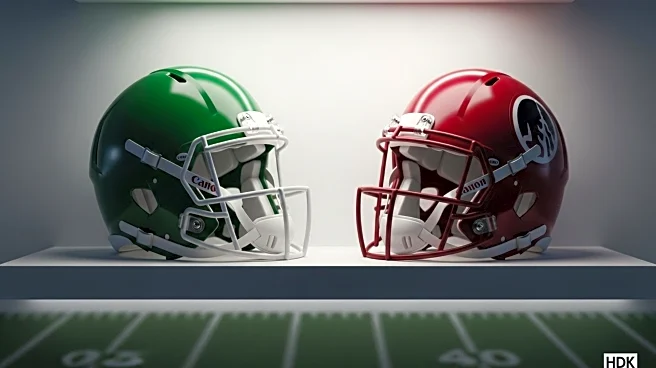What's Happening?
The Green Bay Packers and Washington Commanders are set to face off in Week 2 of the NFL season, with the game being broadcast exclusively on Prime Video. Both teams secured victories in their season openers, with the Packers defeating the Lions and the Commanders overcoming the Giants. The matchup will feature key players such as Jordan Love for the Packers and Jayden Daniels for the Commanders. The game will take place at Lambeau Field in Green Bay, Wisconsin, and is scheduled to kick off at 8:15 p.m. ET. This marks a significant event as it continues the trend of streaming services gaining exclusive rights to major sports broadcasts.
Why It's Important?
The exclusive streaming of the Packers vs. Commanders game on Prime Video highlights the growing influence of digital platforms in sports broadcasting. This shift impacts traditional television networks and could alter how fans access live sports content. For the NFL, partnering with streaming services like Prime Video expands their audience reach and offers new revenue opportunities. Fans may benefit from enhanced viewing experiences, but it also raises concerns about accessibility for those without streaming subscriptions. The game itself is crucial for both teams as they aim to build momentum early in the season.
What's Next?
As streaming services continue to secure exclusive sports broadcasting rights, traditional networks may need to adapt their strategies to remain competitive. The NFL's partnership with Prime Video could lead to more games being streamed exclusively, potentially changing the landscape of sports media. Fans can expect more interactive and personalized viewing experiences as technology evolves. For the Packers and Commanders, the outcome of this game will influence their standings and could impact their strategies in upcoming matches.
Beyond the Headlines
The move towards streaming-exclusive broadcasts raises questions about the future of sports media and its impact on fan engagement. It challenges the traditional model of sports broadcasting and could lead to broader changes in how sports are marketed and consumed. Additionally, it highlights the role of technology in shaping cultural and entertainment experiences, with implications for media companies, advertisers, and consumers.











